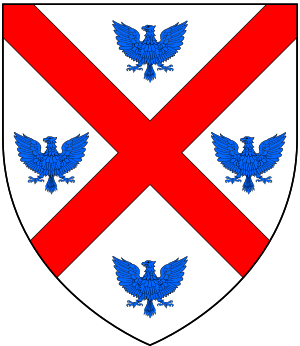Richard Hampden facts for kids
Richard Hampden (born 1631 – died 1695) was an important English politician. He was a member of the Whig Party, which supported Parliament's power. Richard was the son of John Hampden, a famous person who protested against unfair taxes.
In 1689, Richard Hampden became a Privy Counsellor, which meant he advised the King. From 1690 to 1694, he held a very important job as Chancellor of the Exchequer. This role was like being in charge of the country's money.
Contents
Richard Hampden's Life in Politics
Just like his father, Richard Hampden supported the Parliament against the King, especially the House of Stuart family. This was a time when England was often divided between those who supported the King and those who supported Parliament.
Early Political Career
During a time when England was run by Oliver Cromwell (called the Lord Protector), Richard Hampden was elected to Parliament. In 1656, he became a Member of Parliament for Buckinghamshire. He even voted to offer Oliver Cromwell the crown, which would have made Cromwell king.
Later, in 1657, he joined the "Other House," which was like the House of Lords during Cromwell's rule. He continued his political work, often representing the area of Wendover, where his family had a lot of influence.
Standing Up to the King
After 1667, Richard Hampden became more active in politics. He spoke out against England's war with the Dutch and its alliance with France. He believed these actions were not good for the country.
He was a strong supporter of Parliament's rights. During a time called the Popish Plot, he worked to challenge the power of the King's chief minister, the Earl of Danby.
Supporting the Exclusion Bill
Richard Hampden was re-elected to Parliament in 1679. He played a big part in trying to pass the Exclusion Bill. This bill aimed to stop the Duke of York (who later became King James II) from becoming king because he was Catholic. Hampden also supported a bill that would allow Protestants who were not part of the official Church of England to practice their religion freely.
In 1681, he was elected to the Oxford Parliament for Buckinghamshire. During this short Parliament, he again strongly supported the idea of excluding James from the throne.
Working with William of Orange
When King James II came to power in 1685, Richard Hampden was less active in politics. This was because James II was the very person Hampden had tried to prevent from becoming king.
However, things changed when William of Orange successfully invaded England in 1688. Richard Hampden led a group of Members of Parliament who invited William to take over the government. Hampden was a key figure in the Convention Parliament of 1689. He helped create the laws that allowed William and Mary to become King and Queen of England.
In February 1689, he became a Privy Counsellor, and in April, he became a commissioner of the Treasury.
Chancellor of the Exchequer
In 1690, Richard Hampden was elected to William and Mary's first Parliament for Buckinghamshire. In the same year, he was given the important job of Chancellor of the Exchequer. For the next five years, he was very active in the government, helping to manage the country's finances.
Richard Hampden did not run for re-election in 1695. He passed away on December 15, 1695.
Richard Hampden's Family
Richard Hampden married Letitia Paget. They had three children:
- John Hampden
- Richard Hampden, who died when he was young
- Isabella Hampden, who married Sir William Ellys
 | Delilah Pierce |
 | Gordon Parks |
 | Augusta Savage |
 | Charles Ethan Porter |


